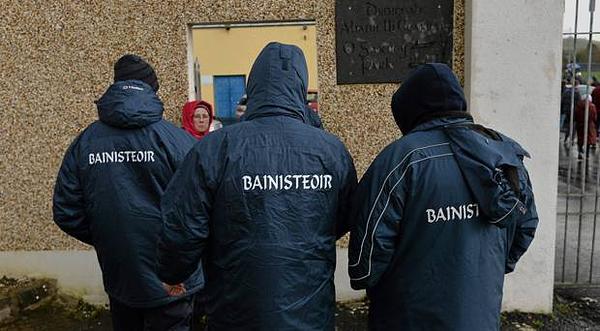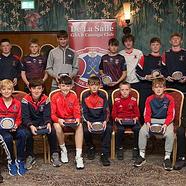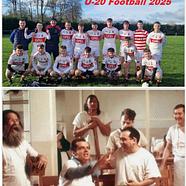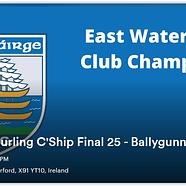by Colm O'Rourke:
The GAA is the most wonderful way to study a vast range of human behaviours — sometimes in the same person during the same game. There are, however, vast differences between the people involved in this wonderful game. Here are some of the principal characters.
The Manager
This is a man of great importance, at least in his own mind. His word is gospel. It is his team and his way of doing things. No differing viewpoint is tolerated in case it is seen as weakness. Training is called at crazy times to demonstrate his authority. Ego is his middle name.
When the team win it is part of his great tactical awareness. A loss is certainly down to the players. “You have all let me down again,” is the first thing said in the dressing-room after the match. The team belongs to him and every little insecurity in a man like this is reflected in his team. Such managers have a short shelf life. Sometimes there is an immediate impact with tough training and a harsh regime but it generally leaves long-term damage.
A drinks ban is part of his great tactical masterpiece. Players may take the abuse for a while but then realise that what is supposed to be enjoyment is worse than hard labour so they either walk away quietly or stop playing. Unfortunately there are a few of these stone age warriors around, most of them though have been culled.
The Manager of People and Team Manager
This man is comfortable in his own skin and it reflects in his dealing with his players, selectors and the committee. He believes in debate and encourages ideas, especially among his management team. The growth and development of players as people is just as important as results.
This person does not measure success solely in terms of winning the league or championship. Are the players getting themselves sorted in terms of education and employment? Are they contributing to the long-term development of their club or county? Are they friends to those in need? Can they rise above personal selfishness and self-interest? The traits of a successful life can be learned in this environment.
Yet there is also discipline and tough decisions are made, and sometimes players will even feel they are not being treated fairly. Long faces are part of every good team where there is competition for places.
This manager tries to look after his players if they are injured, or have personal setbacks, or are looking for jobs — and anything else that is lobbed at him. He behaves as a benign parent would, gently scolding but generally praising. When he eventually gets the push he walks away without looking back in anger. This is the manager we all want to be.
The Father
This man has little or no knowledge of the game but because his son has a bit of talent he suddenly becomes the sideline sniper. Everyone knows him at matches because he parks himself in a position where he can be heard. He is an expert on tactics, training and selection. When he is asked to get involved in the team he declines as he is much too busy at work.
His son might behave like a right prat but not in the eyes of his father. It is the rest of the team who are causing the problem. “Why wouldn’t he get frustrated when he is taking up great positions and not getting the ball?”
Naturally the referee gets his share of it too at every game. And the manager. Eventually it all comes to a head and people get fed up listening to his constant moans, even if many are intimidated by his aggressive conduct. He is told he must tone down. This is a complete insult and he walks away and joins another club, taking Junior with him. Soon after, Junior stops playing altogether.
The Dad
The dad’s job is to be driver, umpire, linesman, kitman, consoler, counsellor, ice-cream buyer and sometimes even the manager. He is positive, good-natured, helpful, good-humoured and realises it is not about him. He is not trying to live his football life through his son, who has more talent than he ever had. He sees football as an opportunity to be healthy, to make friends, build community spirit and to enjoy himself. He is not looking for anything back.
I only came to fully realise the difference between a father and a dad recently after watching Blues Sisters, that excellent documentary on the Dublin ladies’ football team and their road to All-Ireland success after a lot of sickening defeats. Sinead Finnegan spoke movingly about her late dad who she described as “football mad” and it took her a while to get back into football after he died. She recalled one game where she was playing a “stinker” and was taken off by the Dublin management. When her dad met her afterwards he said, “Sinead, you were great”. She could do “no wrong” in his eyes. Every little girl and boy should have a dad like that. It keeps the GAA breathing.
The Occasional Follower who calls themselves a supporter
This person has no time for winter football. That is for muck savages. The season starts in April and the follower might get in a couple of league games if in the mood. Sure, there has been talk in the pub of lads who are making a splash but he will be able to judge them on one outing as soon as he gets to the field. There are no in-betweens, they are either great or useless. The manager gets the same scrutiny, the comments are often negative and laced with bitterness. This is a man who blames his failures in life on others.
Like many followers of other sports, he talks through his pocket. When his team is winning his bets pay for a night out and the praise of players is way over the top, but a loss brings a sharp response. These types do not last the course. The precarious nature of football does not suit their cynical disposition. They don’t see the good in others when things go wrong.
The Supporter
This man can’t wait to get out in winter. Have coat, will travel. He is the eternal optimist. He sees progress when there is none and sees many brilliant young players in winter, most of whom disappear like the snow in spring. The supporter buys the jersey and all the kit, he defends the team even when he knows the prophets of doom are right. He doesn’t jump on the manager as he understands that the policy of continually shafting the manager gets the same result. Nothing.
The supporter buys the tickets, knows the players by name and makes it his business to make some positive comment to them when they leave the dressing-room after a defeat or when he meets them in the days after. Enthusiasm never wanes and there is great belief in the power of positive thinking. Some day he hopes to see his club team win a championship or his county do a smash and grab for a provincial title.
But the enjoyment is being there and feeling part of it on both good days and bad. As life sentences go it is a blessing for the supporter. There are many of this type in every unit of the GAA. If there was not we could all fold our tents and go home.
So if you are in a club with a manager of people, a dad and a supporter then treasure them. The others are there too, the self-important manager, the overbearing father and the occasional follower. . . try to ignore them.







